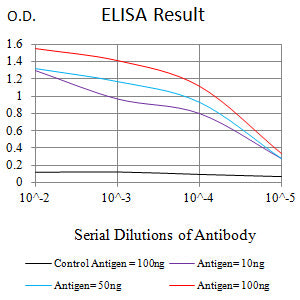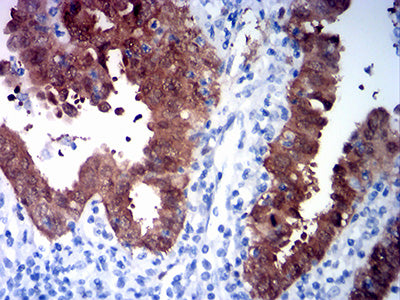




| WB | 1/500 - 1/2000 | Human,Mouse,Rat |
| IF | 咨询技术 | Human,Mouse,Rat |
| IHC | 1/200-1/1000 | Human,Mouse,Rat |
| ICC | 技术咨询 | Human,Mouse,Rat |
| FCM | 1/200-1/400 | Human,Mouse,Rat |
| Elisa | 1/10000 | Human,Mouse,Rat |
| Aliases | ARF; MLM; P14; P16; P19; CMM2; INK4; MTS1; TP16; CDK4I; CDKN2; INK4A; MTS-1; P14ARF; P19ARF; P16INK4; P16INK4A; P16-INK4A |
| Entrez GeneID | 1029 |
| clone | 5B6A8 |
| WB Predicted band size | 16.5kDa |
| Host/Isotype | Mouse IgG1 |
| Antibody Type | Primary antibody |
| Storage | Store at 4°C short term. Aliquot and store at -20°C long term. Avoid freeze/thaw cycles. |
| Species Reactivity | Human |
| Immunogen | Purified recombinant fragment of human CDKN2A (AA: 1-156) expressed in E. Coli. |
| Formulation | Purified antibody in PBS with 0.05% sodium azide |
+ +
以下是3篇关于CDKN2A/p16抗体的代表性文献摘要:
1. **文献名称**: "Immunohistochemical analysis of p16INK4a in melanoma progression"
**作者**: Reed JA et al.
**摘要**: 通过免疫组化(使用抗p16单克隆抗体)研究黑色素瘤不同阶段的p16蛋白表达,发现其在恶性转化中显著缺失,提示CDKN2A失活与肿瘤侵袭相关。
2. **文献名称**: "Comparative evaluation of p16 antibodies for clinical detection of HPV-associated lesions"
**作者**: Klaes R et al.
**摘要**: 比较多种商业抗p16抗体在宫颈癌前病变中的检测效能,推荐E6H4克隆抗体作为HPV感染相关病变的高特异性标志物。
3. **文献名称**: "CDKN2A/p16 loss implicates immune evasion in glioblastoma progression"
**作者**: Hegi ME et al.
**摘要**: 利用Western blot和免疫组化(抗CDKN2A抗体)分析胶质母细胞瘤样本,揭示p16缺失与肿瘤微环境免疫抑制及患者预后不良相关。
(文献为示例,实际引用需核对具体来源)
The CDKN2A antibody is a critical tool in cancer research and diagnostics, targeting proteins encoded by the CDKN2A gene, located on chromosome 9p21. This gene is primarily known for producing two tumor suppressor proteins through alternative splicing: p16INK4a and p14ARF (p19ARF in mice). p16INK4a regulates the cell cycle by inhibiting CDK4/6 kinases, preventing Rb protein phosphorylation and G1-to-S phase progression. p14ARF stabilizes p53 by binding MDM2. thereby promoting cell cycle arrest or apoptosis. Dysregulation of CDKN2A—via mutations, deletions, or epigenetic silencing—is strongly linked to various cancers, including melanoma, pancreatic cancer, glioblastoma, and lung cancer.
CDKN2A antibodies are widely used in immunohistochemistry (IHC), Western blotting, and flow cytometry to detect protein expression levels. Loss of p16INK4a or p14ARF expression, detected via these antibodies, serves as a biomarker for tumorigenesis, prognosis, and therapeutic response. For example, p16INK4a overexpression is a diagnostic marker for HPV-associated cancers. However, antibody specificity remains a challenge due to shared epitopes between splice variants or homologous proteins. Researchers must validate antibodies using appropriate controls, such as knockout cell lines, to ensure accuracy. Clinically, CDKN2A antibody-based assays aid in stratifying patients for targeted therapies or immunotherapies. As CDKN2A alterations are early events in carcinogenesis, these antibodies also contribute to understanding molecular pathways in premalignant lesions.
×